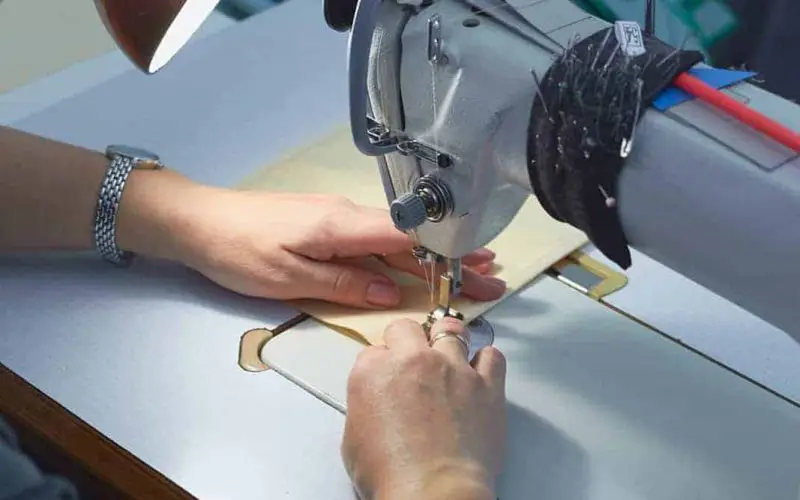Are you looking to buy the best industrial sewing machine 2023? This comprehensive guide is here to help you make an informed purchase decision!
You will find all the information necessary to decide which industrial sewing machine perfectly suits your needs.
Best industrial sewing machine 2023
- Juki DDL-8100 industrial machine(Editor’s Pick)
- Juki DDL-8700 industrial machine(Best Overall)
- Consew industrial sewing machine(Budget Friendly)
- Juki DDL-5550 industrial machine
- TBVECHI 20U43 industrial machine
- Yamata KS-0303 industrial machine
- JUKI DDL-5550 industrial machine
1) Juki DDL-8100 Industrial Machine
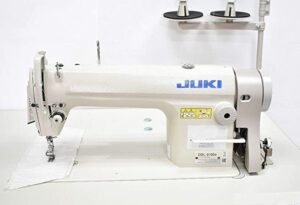
Auto-lubricating full rotary hooks are on the Juki DDL-8100. This innovative technology makes sewing quiet and precise. Automatic lubrication eliminates maintenance and lets you sew.
Extra-Long Stitch
Juki DDL-8100 lasts. Its auto-lubricating full rotating hook technology makes it a long-term investment. Try new designs with the machine’s 13mm maximum stitch length.
Unleash Creativity
Juki DDL-8100 creativity is limitless. Its quiet, fast operation makes sewing fun. This machine suits professional dressmakers, home sewers, and fabric crafters.
Versatility Meets Reliability
The Juki DDL-8100 handles silk and denim well. It performs well regardless of project complexity. This consistency gives you confidence to solve new issues and make gorgeous garments with every thread.
Sewing perfection is Juki DDL-8100. The greatest sewing machine has modern features, an auto-lubricating complete rotary hook, and lengthy stitch length. Sew heirlooms with the Juki DDL-8100. Perfect, Juki DDL-8100.
Must Read – Best sewing machine for advanced sewers
Pros:
- measures 0.04″D x 0.71″W x 0.35″H
- weighs 57.32 pounds
- Auto-lubricating feature for smooth operation
- Suitable for light and medium-weight fabrics
- Maximum stitch length of 13mm for heavy fabrics
Core Feature
| Brand | Juki/IKonix |
| Color | White |
| Product Dimensions | 0.04″D x 0.71″W x 0.35″H |
| Item Weight | 57.32 Pounds |
| Maximum stitch length | 13 mm |
2) Juki DDL-8700 Industrial Machine
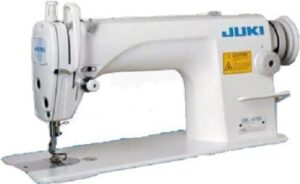
DDL-8700 Overview
Fast, single-needle lockstitch industrial sewing machine Juki DDL-8700. White metal machine is strong. The sturdy Juki DDL-8700 weighs 70 pounds and measures 7.48 inches deep, 7.87 inches broad, and 3.9 inches tall. Fuel power sews 5500 threads per minute at 5mm.
DDL-8700 Power
The Juki DDL-8700 sews delicate to heavy fabrics. Due to its durability, it can handle big loads.
Industrial Speed
Juki DDL-8700 is fast. It’s great for rapid, precise sewing. Mass-producing clothes, leather, and upholstery is faster with this equipment.
Fuel-Powered Reliability
Reliable fuel-powered Juki DDL-8700. Industries’ stitching processes will continue with this machine’s electrical supply stability. Stability reduces production time and cost.
Flexible Creativity
Versatile Juki DDL-8700. This flexible machine stitches delicate details and precise stitches. The Juki DDL-8700 lets seamstresses and tailors be creative.
Timeless Stitching
Juki DDL-8700 performance and reliability are long-term investments. Its metal design and fine engineering make it durable and low-maintenance.
Juki DDL-8700
Industrial sewing machines like the Juki DDL-8700 are powerful and versatile. Fuel-powered reliability, speed, and endurance beat competition. Craftsmen will love the Juki DDL-8700. The Juki DDL-8700 makes sewing marvels.
Must Read – Best sewing machine for denim
Pros:
- Fuel-powered for continuous operation
- measures 7.48″D x 7.87″W x 3.9″H
- Suitable for a variety of fabrics
- Sturdy build for long-term use
- Maximum stitch length of 5mm
Core Feature
| Brand | Zoje |
| Color | White |
| Material | Metal |
| Product Dimensions | 7.48″D x 7.87″W x 3.9″H |
| stitches/minute | 5500 |
| Item Weight | 70 pounds |
3) Consew Industrial Sewing Machine

Consew industrial sewing machines can withstand harsh conditions. Industrial stitching is reliable with its alloy steel design.
Oil Flow
Consew sewing machines with revolutionary adjustable oil flow. This unique function helps you fine-tune the oil provided to the machine’s moving parts for unparalleled precision and fluidity. Oil flow regulation improves sewing and minimises maintenance.
Multi-Fabric Handling
Consew sewing machines can handle light and heavy fabrics. It is versatile and efficient for industrial stitching applications.
Strong Sizes
Consew machines are right-sized and powerful. Its 0.12″D x 0.16″W x 0.16″H dimensions and 185-pound weight provide stability without bulk. Its AC motor lets you control every stitch.
Consew Optimises
Consew industrial sewing machines work best. Its strong construction, adjustable oil flow, and adaptability to different textiles let you work swiftly without losing quality. Your industrial sewing workspace will need the Consew machine.
Conclusion Industrial stitching is Consew’s forte. Its robust alloy steel design, variable oil flow, and capacity to handle varied materials make it an industry game-changer. The Consew sewing machine eliminates inefficiency. Buy this great performance immediately to increase productivity!
Must Read – Best sewing machine for beginners
Pros:
- Adjustable oil flow for smooth operation
- Heavy-duty build for industrial use
- Suitable for a variety of fabrics
- weighs 185 pounds
- measures 0.12″D x 0.16″W x 0.16″H
Core Feature
| Brand | CONSEW |
| Color | White |
| Material | Alloy Steel |
| Product Dimensions | 0.12″D x 0.16″W x 0.16″H |
| Item Weight | 185 Pounds |
| Power Source | AC |
| Oil Flow | Adjustable |
4) Juki DDL-5550 Industrial Machine

Workhorse Juki DDL-5550 stitches 5500 stitches per minute. This speed enables you accomplish tasks rapidly with high-quality stitches. This machine handles light and heavy textiles.
Juki DDL-5550’s LED lamp inspires creativity. Built-in illumination simplifies stitching. The LED bulb makes stitching clear and accurate.
Fabric Control
Juki DDL-5550 presser foot reverse lift. This eliminates tedious fabric removal after sewing. Sewists and tailors work faster with this machine.
Space-Efficient Design
The 21.7″D x 47.2″W x 54.3″H Juki DDL-5550 fits several workstations. Its compact size maximises space while providing a powerful and reliable sewing companion.
Durable Building
Juki DDL-5550 can handle industrial sewing. This machine is precision-built for heavy daily use. Its resilience makes it ideal for sewing businesses.
Speed, accuracy, and efficiency
The Juki DDL-5550 is the fastest, most precise, and efficient professional sewing machine. The LED lamp and reverse presser foot raise make this industrial sewing machine stand out. Easily stitch masterpieces with the Juki DDL-5550. Increase your sewing output today with this strong machine.
Must Read – Best sewing machine for free motion quilting
Pros:
- LED lamp for improved visibility
- powered by AC/DC
- Suitable for a variety of fabrics
- Reverse lift of presser foot for easy fabric removal
- measures 21.7″D x 47.2″W x 54.3″H
Core Feature
| Brand | IKonix |
| Color | White, Grey |
| Product Dimensions | 21.7″D x 47.2″W x 54.3″H |
| Power Source | Ac/dc |
| stitches/minute | 5500 |
| Max. Stitch Length | 5mm |
5) TBVECHI 20U43 Industrial Machine

The TBVECHI 20U43 is a portable industrial sewing machine that is designed for use in various applications such as upholstery, clothing, and leatherwork.
Reverse feeding distinguishes the TBVECHI 20U43. Sewing in reverse strengthens stitches and prevents fraying. This makes your stitching last, giving you confidence.
Zipper Seam Sewing: Maximum Versatility
TBVECHI 20U43 simplifies zipper seams. This fantastic machine handles zipper seams easily. This machine inserts zippers for clothing, home decor, and other sewing applications. Sew zipper-free.
DPX5 Needle Power:
TBVECHI 20U43 uses DPX5 needle. This needle stitches 2000 RPM. This high-performance needle finishes projects swiftly and precisely for a professional look.
Corded Electric: Continuous Sewing
TBVECHI 20U43 stitches with corded electricity. No batteries or power loss. Plug in and sew.
Design and Durability: Ideal
TBVECHI 20U43 combines performance, design, and durability. Its style and robustness assist any sewing studio or workspace.
TBVECHI 20U43 Unlocks Sewing Potential
TBVECHI 20U43 sewing machine is a gem. Its reverse feeding mechanism, smooth zipper seam stitching, high-speed DPX5 needle, corded electric power, and perfect design make sewing easier.
The TBVECHI 20U43 helps you master sewing and create masterpieces. This fantastic sewing machine will help you create. TBVECHI 20U43: Sew like never before!
Must Read – Best sewing machine for heavy fabrics
Pros:
- Item Weight 30 Kilograms
- Reverse feeding mechanism for reinforced stitches
- Max Speed with 2000 RPM
- Sewing of zipper seams
- Corded electric power source
Core Feature
| Brand | TBVECHI |
| Color | White, Black |
| Item Weight | 30 Kilograms |
| Power Source | Corded Electric |
| Max Speed | 2000 RPM |
| Needle | DPX5 |
6) Yamata KS-0303 Industrial Machine

A sturdy corded electric system powers the Yamata KS-0303 for uninterrupted sewing. Its 2,000-stitch-per-minute maximum speed ensures precision and efficiency.
Heavy Fabric Capability
The Yamata KS-0303 excels in handling bulky textiles. This machine can handle thick upholstery or leather. Even through thick fabrics, the 36.5mm needle bar stroke offers smooth and consistent sewing.
Always Perfect Stitching
The Yamata KS-0303’s 9mm maximum stitch length ensures perfect results. Quilting and upholstery require accuracy to create beautiful, long-lasting pieces. Avoid uneven stitching and embrace quality craftsmanship.
Reliability and Durability
Industrial sewing machines must be durable and reliable. Due to its solid structure and high-quality materials, the Yamata KS-0303 excels in both. This machine can handle constant use and produce excellent results.
User-Friendly Design
The Yamata KS-0303 is user-friendly and powerful. This powerful sewing machine is designed for beginners to learn quickly. Focus on your creativity with effortless control.
Conclusion
In conclusion, the Yamata KS-0303 is the best heavy-duty industrial sewing machine for performance, adaptability, and usability. Its high-speed precision and capacity to handle heavier fabrics make it a trusted stitching partner. This machine will improve your upholstering and quilting. Buy the Yamata KS-0303 and enjoy flawless sewing like never before.
Must Read – Best sewing machine for kids
Pros:
- stitches per minute 2,000
- Needle bar stroke 36.5mm
- Corded electric power source
- Maximum stitch length of 9mm
- Suitable for heavy fabrics
Core Feature
| Brand | Yamata |
| Color | White |
| Material | Canvas |
| Power Source | Corded Electric |
| stitches per minute | 2,000 |
| Needle bar stroke | 36.5mm |
| Max. stitch length | 9mm |
7) JUKI DDL-5550 Industrial Machine

Precision and stitch length
The JUKI DDL-5550 allows stitch settings up to 5mm. This machine can sew delicate or strong seams.
110V industrial clutch motor is JUKI DDL-5550’s greatest feature. This motor handles heavy textiles effortlessly. JUKI DDL-5550 easily sews heavy materials.
DDL-5550 Industrial Advantages
Fast and Effective
Industrial stitching needs speed. The JUKI DDL-5550’s quick sewing increases project completion, enhancing productivity. Precision and efficiency yield high-quality goods.
Longevity
JUKI DDL-5550 is reliable. Industrial sewing machines last.
Flexibility
Stitch length and motor strength make the JUKI DDL-5550 flexible. This machine can sew lightweight and thick fabrics.
Correct Stitching
Sew flawlessly using the JUKI DDL-5550’s stitch control. Craftsmen need accuracy.
User-friendly
Professional-grade but user-friendly, the JUKI DDL-5550. Beginners can utilise industrial sewing machines due to their simple interface and settings.
Conclusion
JUKI DDL-5550 industrial sewing revolutionises. Its high-speed performance and versatility come from the industrial clutch motor. Industrial stitching is easier with the JUKI DDL-5550. Excel today!
Must Read – Best sewing machine for leather
Pros:
- measures 20″D x 48″W x 48″H
- Suitable for heavy-duty fabrics
- Max. Sewing Speed 5500 stitches/minute
- Corded electric power source
- Durable build made from
Core Feature
| Brand | JUKI |
| Color | White |
| Material | Leather |
| Product Dimensions | 20″D x 48″W x 48″H |
| Power Source | Corded Electric |
| Max. Sewing Speed | 5500 stitches/minute |
Best industrial sewing machine 2023-Complete Buying Guide
Introduction to industrial sewing machines – What You Need to Know
Industrial sewing machines are specially built to tackle heavy-duty workloads. When you’re in search of industrial machinery, there are a few things you should take into consideration. This comprehensive buying guide will walk you through the essentials of choosing the right machine for your needs.
We will explain what makes an industrial machine different from a regular one, the features and specs to consider, as well as helpful tips for upkeep. When purchasing any kind of machinery or equipment it pays to do some research before making your final decision. We hope this guide will assist you in finding the best industrial sewing machine for your business. Let’s get started!
Explanation of industrial sewing machines
Industrial sewing machines have been around for over a century, and they have revolutionized the way that clothing, furniture, and other items are produced. Industrial sewing machines are designed to produce large amounts of clothing, accessories, or other items with speed and efficiency.
These machines are specialized tools that can be used in many different industries including clothing production, quilting and upholstery work. They provide more power, higher speeds of stitching than their domestic counterparts and automated functions that help speed up the sewing process. Industrial sewing machines can also be used to create intricate designs using computer-aided design programs that allow users to create patterns like embroidery.
Industrial sewing machines differ from consumer-level models in several areas including size, weight of materials they’re able to stitch through, maximum stitch rate and number of needles available at one time. Since industrial machines are intended for daily use by experienced sewers who often create hundreds or thousands of items on a regular basis with their machine its important to know exactly what you need in order to find the best model possible for your particular needs before investing your money into it.
In this guide we will cover the basics such as types of industrial sewing machines available on the market today as well as some important features worth considering before making your purchase.
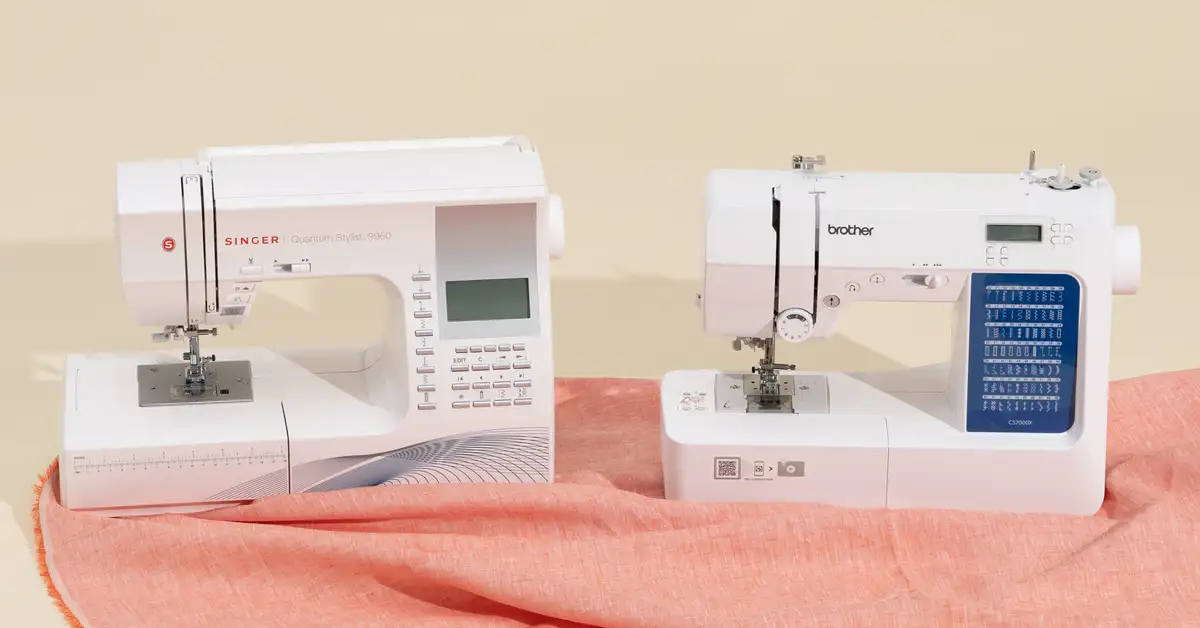
Photo Source : nytimes.com
Importance of industrial sewing machines
Industrial sewing machines are important components of the garment production industry. They are designed to produce large amounts of garments in a quick, accurate, and cost-effective manner. The machines can sew a wide range of fabrics including cotton, vinyl, leather and other dense or lightweight materials.
Industrial sewing machines come in many varieties, each tailored to meet specific needs. Different types of industrial stitches are capable of different outcomes: these range from utility stitches used for simple mending or reinforcement stitching to decorative topstitching or embellishments used in fashion design.
With the help of an industrial machine, stitching times are significantly reduced compared to those accomplished by hand. Industrial sewing machines generally have greater stitch accuracy ensuring consistent quality results even after multiple uses; this makes them an invaluable tool for designers and producers alike.
Types of industrial sewing machines
Industrial sewing machines come in several types, each of which is designed for a different purpose. It’s important to understand the differences between them so you can make the right choice for your specific needs.
- Lockstitch Machine: Lockstitch machines use two threads and are one of the most common types used in industrial applications. The lockstitch machine creates a stitch by interlocking thread from the upper bobbin and thread from the lower bobbin. This type of machine is ideal for sewing regular fabrics since it creates a secure seam with even tension on each side.
- Overlock Machines: Overlock machines also use two threads but create a much more complex stitch pattern for seam finishes on knits, denim, and other heavier fabrics. An overlock machine creates a series of looped stitches around the edge of fabric to prevent unraveling or fraying at the edges and to create decorative edges on garments or home decor projects like table linens or drapery panels.
- Coverstitch Machines: Coverstitch machines are similar to overlock machines but usually have just one thread instead of two, leaving stitches that look like they’re overlapping one another on both sides of the fabric edge. This type of stitching is commonly used on hems and collars when creating garments because it has an invisible look while still providing strength and flexibility in its seams.
Flatbed machines
Flatbed machines are usually well built, bulky, and heavy duty. The flat bed allows the user to have precise control over stitch work and sizes. Most flat bed sewing machines used in industrial settings come equipped with multiple needles, allowing for robust construction.
The most commonly used flatbed machines include: single needle lockstitch machine; double needle lockstitch machine; three-thread overlock machines; multi-needle machines; cylinder arm/ tubular (sleeve) sewing machines; leather sewing Machines and industrial walking foot sewing machine.
Flatbed industrial machines are primarily used in the production of garments as they offer a large spacious work area. Well known brands in this industry include Singer, Brother, Pfaff, Juki, Merrow and Union Special among others. Apart from garment production these types of sewing equipment can be used to make products such as canvas backpacks, camping tents or upholstery for furniture for example.
Cylinder-bed machines
Cylinder-bed machines are popular on heavy materials, such as canvas and leather. As their name implies, the arm of the machine is cylindrical in shape, allowing for more space and flexibility to sew around bulky items. The presser foot can be lowered so that the material can be pushed around a curved needle plate while still controlling where the needle penetrates the fabric. Cylinder-bed machines come with cylinder arms of various sizes, including short, medium and large. They also offer different bed lengths ranging from 6 to 14 inch.
Features to consider when shopping for a cylinder-bed industrial sewing machine include stitch length adjustment, reverse feed capability, adjustable speed controls and a built-in thread cutter or thread trimmer. Machines may be servo motor driven or operated manually by use of a handwheel or foot peddle. Different models may also come with accessories such as bobbins, needles and servo motor stand kits for added convenience and dependability. Many also offer adjustable working distances from 0-6mm on either side of the needle for improved accuracy when creating complex patterns or bends in fabrics like jeans.
Post-bed machines
Post-bed industrial sewing machines get their name from the vertical post that extends from the base to the top of the machine’s frame. This post supports a horizontal arm that holds the operator’s bed, offering a perfect platform for larger or wider projects.
Post-bed machines are also popular for their large working area for handling materials thicker than your traditional fabrics. Their fast sewing speed, combined with the ability to handle thicker materials, makes them ideal for many different types of projects, particularly garments and upholstery.
Some of the common types of post-bed machines available include flatbed, horizontal axis, and cylindrical. As is true with any industrial equipment, there are pros and cons associated with each type of machine. Consumers should research each type to determine which one will be best suited to their particular sewing needs before making a purchase decision.
Factors to consider when buying an industrial sewing machine
In order to make an informed decision of the best industrial sewing machine for your needs, it is important to consider a number of factors. Understanding what these factors are and how they can affect the performance of your machine will help you make an informed decision.
Performance: Sewing speed and stitch quality are the two most important performance considerations when buying an industrial sewing machine. The type and weight of material being sewn will affect the sewing speed needed. Stitch quality is dependent on the number of needles that can be used, as well as on features such as needle thread tensioners and bobbin winders. The number of layers that can be stitched together will also have an impact on overall performance.
Durability: Industrial sewing machines must be able to stand up to very heavy use over extended periods of time. This means that they should be constructed from robust materials like cast iron, with rust prevention features built in. Look for machines with strong motors, solid construction, and sturdy frames that can handle large amounts of material weighted down with several layers at once.
Cost: Industrial sewing machines tend to cost much more than domestic machines due to their construction quality and advanced features. To save money, consider buying a refurbished machine or one with pre-owned parts; however, it’s important to make sure these parts meet safety standards before purchase. If possible, research industry reviews on similar models before committing; this could help save you money in the long run if there are any known issues with certain models or brands that could effect future repairs or replacements further down the line.
Budget
When shopping for an industrial sewing machine, one of the most important things to consider is your budget. Industrial sewing machines can range greatly in price depending on type, features, and size. It is important to set a price limit and determine what features are necessary within that budget.
Don’t forget to reserve money for additional accessories such as bobbins, thread, needles and spare parts. While industrial machines can be costly upfront, they offer superior quality stitching compared to residential machines so they may be more cost effective in the long run.
Carefully compare prices while researching and you may be able to find a good deal if you look in the right places.
Intended use
It is important to consider the intended use of the machine before making a purchase. Ask yourself; what type of sewing do I plan to do? Is it general sewing, like repairing garments, creating curtains or upholstering cushions?
Or are you looking for a machine to work on more tech-intensive projects such as pleating, topstitching, binding and edge stitching? Although any standard industrial machine can tackle the basics, the more complex tasks require a machine with specialized features such as side-loading bobbins or an adjustable stitch length for perfect buttonholes. Consider these factors before evaluating your options.
Stitching speed
The stitching speed of an industrial sewing machine is an important factor to consider when purchasing a machine. Different types of fabrics and projects require different thread types and weight, which can affect the speed at which the machine stitches. There are two numbers for each industrial sewing machine’s stitch speed: revolutions per minute (RPM) and stitches per minute (SPM). The RPM measures how many times the bobbin wheel rotates in one minute, while SPM measures how many stitches are being produced in one minute.
As a general rule, lighter fabrics need slower speeds as too much motion could cause fabric puckering, while heavier fabrics can withstand higher speeds without damage to the fabric. Additionally, machines with higher RPMs usually mean better control over stitching tension. However, you should also take into account the material you’re working with; some types of delicate fabrics may be more susceptible to damage from high stitch speeds even though they are less likely to be affected by low stitch speeds.
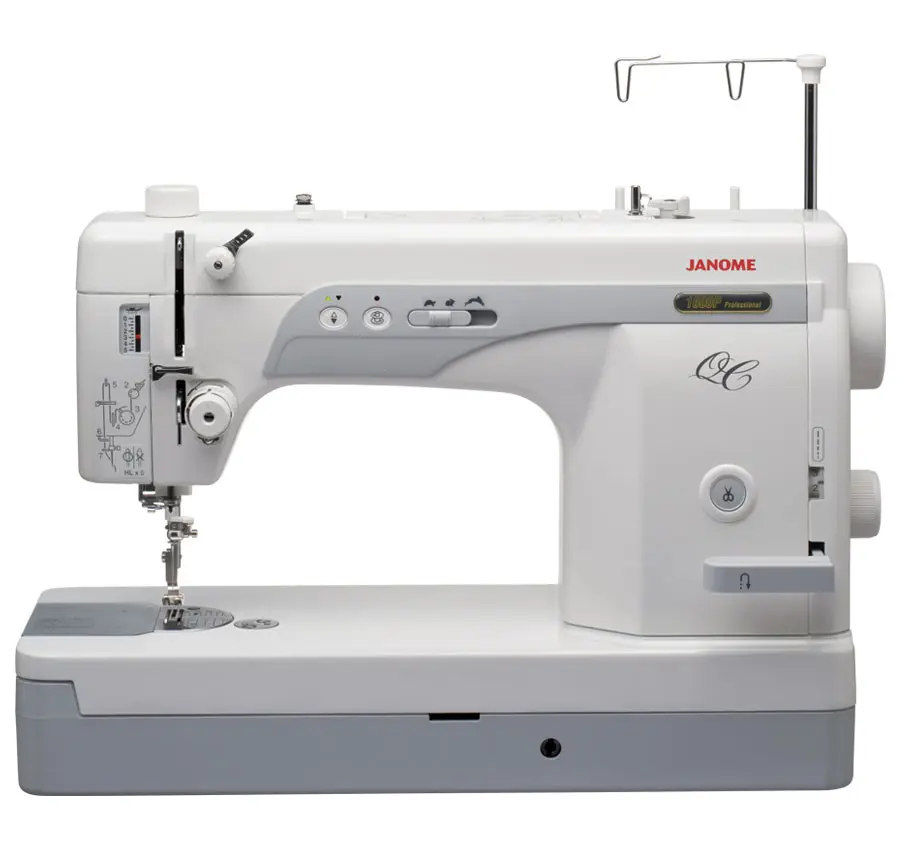
Photo Source : quiltnco.com
Conclusion
Making the right choice of industrial sewing machine depends on your individual needs. Are you a business owner looking for a sewing machine for larger items and heavy-duty materials, or are you a home sewist working with fabric and denim? We recommend researching which models would best meet your needs before investing in an industrial sewing machine. Consider the types of projects you need the machine to complete, as well as its speed, durability, available features and warranty. Understanding what you expect from a commercial-grade sewing machine helps ensure you’ll be satisfied with your purchase.
When shopping for an industrial sewing machine, take time to compare your options before making a final decision. Talk to other sewists who have had good experiences with specific models, read customer reviews online and find out what features different brands offer. Doing so helps you find the right solution for tackling heavy-duty projects now — and into the future.
FAQs
Which machine is better jack or JUKI?
It depends on your needs and preferences. Both Jack and JUKI are reputable brands that produce high-quality sewing machines. JUKI is a well-known brand in the industry and has been around for longer than Jack, but Jack also offers a range of reliable and affordable sewing machines.
Are JUKI and Janome the same company?
No, JUKI and Janome are separate companies. They are both well-known brands in the sewing industry, but they have different histories, product lines, and target markets.
What is the difference between an industrial and heavy-duty sewing machine?
An industrial sewing machine is designed for continuous use in a manufacturing or production environment. It is built with heavy-duty components that can withstand high-speed operation and handle thick, heavy materials. A heavy-duty sewing machine, on the other hand, is designed for home use and can handle thicker fabrics and tougher projects than a regular sewing machine, but it is not built to withstand the demands of a commercial setting.
Is a JUKI an industrial sewing machine?
JUKI produces both industrial and home sewing machines. They are well-known for their industrial machines, which are used in factories and other commercial settings, but they also offer a range of high-quality home sewing machines.
Is Juki a Chinese company?
No, JUKI is a Japanese company. It was founded in 1938 and has since become a leading manufacturer of industrial and home sewing machines.
Is it worth buying an industrial sewing machine?
It depends on your needs and intended use. If you are running a sewing business or need a machine for heavy-duty projects, an industrial sewing machine may be worth the investment. However, if you only sew occasionally or for personal use, a home sewing machine may be more suitable.
How long do industrial sewing machines last?
The lifespan of an industrial sewing machine depends on various factors, such as the frequency of use, maintenance, and the quality of the machine itself. With proper care and maintenance, an industrial sewing machine can last for decades.
Which sewing machine is best for all-purpose?
There are several sewing machines that are suitable for all-purpose use, depending on your budget and specific needs. Some popular options include the Singer Heavy Duty 4452, Brother CS7000X, and Janome HD3000.
Can an industrial sewing machine work without electricity?
Some industrial sewing machines can be manually operated, which means they can work without electricity. However, most industrial machines are designed to be used with an electric motor for maximum speed and efficiency.
What are the 3 types of sewing machines?
The three main types of sewing machines are mechanical, electronic, and computerized. Mechanical machines are operated manually and have basic features, while electronic machines have more advanced features and are powered by electricity. Computerized machines are the most advanced type and can be programmed to perform various functions automatically.
